生物燃料对土地利用改变的间接影响
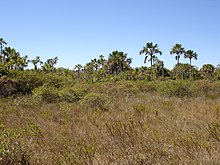
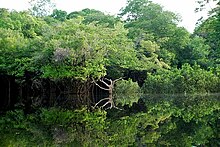
生物燃料对土地利用改变的间接影响(英语:Indirect land use change impacts of biofuels,简称ILUC或是iLUC,发音为 i-luck),谈的是由于世人增加对生物燃料(包含乙醇和生质柴油等)的需求,而发生土地利用改变(参阅土地利用、改变与森林,以扩充相关原物料作物种植面积,这种无心的做法,导致外溢效应,把温室气体排放扩大。[1][2]
世界各地为维持粮食供需平衡,而必须开发原始土地,利用增加耕地面积来抑制高升的农作物价格,其背后的原因是由于原本种植粮食的农地被转作生物燃料原料的生产。由于雨林和草原等自然土地每年都会在植物生长时,把碳储存在土壤和生物质中,因此清理这些土地,就表示会导致温室气体排放的净增加。这类碳泄漏是因为改变土地利用,而间接影响到温室气体的平衡。[1][2][3][4]
其他研究报告的作者也认为,这种土地利用变化也会间接产生其他重大的社会和环境影响 - 譬如说生物多样性、水质、食物与燃料之争、土地利用权、劳动力迁移以及社区和文化的稳定性。[3][5][6][7]
历史
[编辑]对给定生物燃料做碳强度估计,取决于几个变量的假设。截至2008年,针对几种生物燃料的生命周期评估研究,发现美国乙醇燃料、纤维素乙醇和巴西乙醇燃料所产生的温室气体排放,数量低于汽油所产生者。 [8][9][10][11][12][13][14]但这些研究都没把土地利用变化所生的间接影响考虑在内,虽然这类间接影响得到承认,但要对此估计,有过于复杂及难以建模的问题。[2][9]2008年2月,由普林斯顿大学资深研究人员舍清格(Timothy Searchinge)领导的团队在《科学杂志》上发表一篇引起争议的论文,论文的结论是这种间接影响会抵消玉米和纤维素乙醇所产生的直接正面影响,巴西甘蔗乙醇表现较好,但仍会导致少量的碳债务(biofeul carbon debt,即把间接影响考虑在内,所产生的温室气体排放量仍超过利用生物燃料所能减少的排放量)。[1]
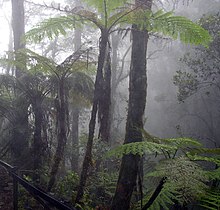
舍清格团队的论文发表之后,关于ILUC的碳排放估算,以及食物与燃料之争两项,成为与生物燃料有关议题中,在大众媒体、[15][16][17][18][19][20][21][22][23]、科学期刊、[1][2][7][24][25][26]社论对页版和科学社群公开信件[4][27][28][29]以及美国和巴西的乙醇产业之中,成为极具争议性的话题。[30][31][32]2009年4月,加州政府所属空气资源委员会 (CARB) 设下规则(包括ILUC影响在内),以制定于2011年生效的加州低碳燃料标准,而让此类争议更为激烈。
美国国家环境保护局(EPA)在2009年5月发布实施2007年美国可再生燃料标准 (RFS) 修订版的拟议规则制定通知。[33]EPA提议的法规也把ILUC包括在内,而在乙醇生产商中引起更多争议。 [34][35][36][37][38]EPA在2010年2月3日发布的最终规则把计算ILUC的模型纳入,此模型在估计上比最初的模型有显著的改进。[39][40]
英国的可再生运输燃料义务计划要求可再生燃料局 (RFA) 报告生产生物燃料过程中的或有间接影响,包括间接导致土地利用变化或食品及其他商品的价格变化。[14]RFA在2008年7月发表的一份名为Gallager评论的研究,其中列出一些风险和不确定性,并表示“针对间接导致土地利用变化产生的温室气体排放量做量化,需要用到主观假设,也包含相当大的不确定性”,需做进一步检查以适当把间接影响纳入计算方法中。[41]欧盟也采取类似的谨慎态度。欧洲议会在2008年12月通过更严格的生物燃料可持续性标准,并指示欧盟委员会制定方法,把间接导致土地利用变化引起的温室气体排放考虑在内。[42]
各式研究与争议
[编辑]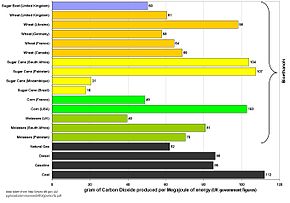
在2008年之前有多项生命周期评估(也称为“Well to Wheels”或WTW评估)的研究,发现玉米乙醇可减少与交通运输相关的温室气体排放。2007年,由Farrel领导的柏克莱加利福尼亚大学团队对之前的6项研究重新评估,结论认为玉米乙醇仅减少13%的温室气体排放。[8][9][12]但由阿贡国家实验室的研究人员Wang所估计的玉米乙醇可减少20%到30%的排放,纤维素乙醇可减少最高达到85%的排放,[9][10]Wang的数字因之得到更多引用。Wang的研究方法为针对1979年至2005年间所发表的22项研究做审查,并采用阿贡国家实验室专有的GREET模型进行模拟。这些研究针对土地利用的直接影响(譬如土地的产能提高、乙醇工厂减少使用能源以及妥善处理生产乙醇时的副产品)。[11][12]对巴西甘蔗乙醇的几项研究显示,在没显著土地利用变化的情况下,以甘蔗为原料可减少86%至90%的温室气体排放。[9][13][14]估计碳强度,取决于作物生产力、农业做法、制作乙醇的工厂使用的能源和能源效率。由于估计ILUC甚为困难,这些研究均未将其列入考虑 。[2][9]于加利福尼亚大学戴维斯分校服务的Delucchi的初步估计则显示,转化为农业用途的新土地,其生命周期的碳排放占有很大的份量。 [9][43]
舍清格等人和法及恩(Fargione)等人研究
[编辑]舍清格等研究人员的结论是ILUC对于生命周期评估会产生影响,玉米乙醇和纤维素乙醇与汽油相比,并没减少碳排放,而是分别增加93%和50%的碳排放量。巴西甘蔗乙醇表现较好,可在4年内恢复最初的碳排放水准,而美国玉米乙醇需要167年,纤维素乙醇需要52年才能恢复最初的碳排放。[1]这项研究把分析限缩在30年的期间,假设是土地转化把土壤中储存的碳排放掉25%,以及遭到清除的植物中所有的碳均被排放。根据报告,如果美国大量使用玉米制造乙醇,而导致出口减少,巴西、中国和印度被认为会受到影响,必须开发它们自有土地以替代由海外地区进口的玉米。开发的面积是根据1990年代各国的历史纪录而估计。[1]
| 舍清格等人的研究结论 玉米乙醇与汽油的温室气体排放 在有及无土地利用变化情况之下比较 (使用百万焦耳燃料所产生的二氧化碳等值物(克))[1][44] | ||||
|---|---|---|---|---|
燃料型态 (美国) |
碳 强度 |
温室气体 减少 |
碳 强度 列入ILUC |
温室气体
减少 |
| 汽油 | 92 |
- |
92 |
-
|
| 玉米乙醇 | 74 |
-20% |
177 |
+93%
|
| 纤维素乙醇 | 28 |
-70% |
138 |
+50%
|
法及恩和他的团队在同一期《科学杂志》上发表另一篇论文,声称开辟土地以生产生物燃料的原料会造成碳赤字(carbon deficit)。这种赤字来自直接,以及间接的土地利用变化。这项研究包含世界6种转化土地利用的情景:巴西亚马逊雨林转化生产大豆,以制造生质柴油、巴西塞拉多热带草原转化生产大豆,以制造生质柴油、巴西塞拉多热带草原转化生产甘蔗,以制造乙醇、印尼或马来西亚低地热带雨林转化生产棕榈油,以制造生质柴油、印尼或马来西亚转化泥炭沼泽森林以生产棕榈油,再制造生质柴油,以及美国中央草原转化生产玉米,以制造乙醇。[45]碳债务的另一定义是土地转化过程后的头50年内所释放的二氧化碳量。研究发现对于玉米和甘蔗这两种制造乙醇的原料,把塞拉多热带草原转换种植甘蔗,需要大约17年才能释放完毕,而把美国中部草原转换种植玉米,需要约93年才能释放完毕。最坏的情况是把印尼或马来西亚的泥炭沼泽森林转变种植油棕,需要大约420年才能释放完毕。[45]
批评与争议
[编辑]舍清格和法及恩的研究结果在大众媒体[4][15][16][17][18][19][21]和科学期刊中引起争议。 航空太空工程学者罗伯特·祖布令认为舍清格的“间接影响分析”法是种伪科学,可用来“证明任何事”。[46]
阿贡国家实验室的Wang和Haq声称:这是种过时的假设;却把提高效率的潜力忽视;且并无证据显示“美国利用玉米生产乙醇,已导致其他国家间接受到影响,而需改变土地的利用”。他们的结论是舍清格证明ILUC“比直接改变土地利用更难建模”。[2]舍清格对每个技术上的反对意见均提出反驳,并断言“......任何计算,如果忽略这些排放(无论建模有多困难),就没足够的基础供决策使用。”[25][47]
由橡树岭国家实验室的Kline和Dale提出的另一项批评,认为舍清格等研究人员,和法及恩等研究人员。 “......关于生物燃料导致土地利用变化,而造成更高排放的说法并未能提供足够的支持”,舍清格和法及恩等人的结论取决于误导性假设 - 在较全面的实地研究发现这些土地发生利用变化“......是由空间和时间背景下的文化、技术、生物物理、经济和人口力量之间的相互作用所驱动,而非透过单一的作物耕作所造成。[26]法及恩等人针对部分的批评回应说,虽然导致土地清理的因素有许多,但他们的“观察并没有降低生物燃料也助长土地清理(无论是在既有,或是在新的土地上所为)的事实”。舍清格对Kline和Dale的所有论点完全不予同意。[26]美国生物燃料产业也做出反应,声称“舍清格的研究显然是针对‘最坏情况’所做的分析……”而这项研究“系依赖于一长串高度主观的假设……”[48]舍清格对每种说法均提出反驳,结论是这些批评无效。他指出,即使他的假设有些有高估,但其研究中也包含许多保守的假设。[47]


巴西
[编辑]Lapola等研究人员在2010年发表的报告中,估计巴西甘蔗和大豆生物燃料种植园扩张,到2020年会完全取代牧地,这种土地利用对碳排放的直接影响很小。[49][50]然而在巴西养牛场的推动下,牧地已经扩张进入亚马逊森林,而把预计的碳排放节约抵销。[50] “到2020年,估计间接发生的森林砍伐面积为121,970平方公里,生产甘蔗乙醇和大豆生质柴油的农作所导致的各占一半,这样产生的碳债务需要大约250年才能释放完毕……”[49]
同一研究还发现种植油棕所造成的土地利用变化和相关碳债务最少。研究中还模拟牲畜密度的增加,发现“全国平均牲畜密度每公顷增加0.13头,可避免生物燃料(即使用大豆作为生质柴油原料)造成的间接土地利用变化,同时仍能满足所有食物和生物能源需求。[49][50]报告作者的结论是要实现有效的碳减排,需强化集约养牛和密集种植油棕,因而建议生物燃料和养牛业之间更密切的合作。[49][50]
巴西主要的乙醇产业组织 (巴西蔗糖产业协会(UNICA) 对此研究的批评是,研究者忽略当地持续集约化的养牛业。 [51]
Arima等研究人员所做研究在2011年5月发表,他们采用空间回归模型,首次对巴西亚马逊地区因大豆生产造成的ILUC进行统计评估。之前对此种影响的研究只是透过轶事或全球性的需求模型进行分析,而Arima等人的研究采用的是针对区域的方法。分析显示在亚马逊盆地南部和东部边缘的定居农业区扩大大豆田,与侵入森林边境的养牛业有关联。结果显示必须把ILUC纳入,以测量大豆作物的碳足迹,无论大豆是为生物燃料还是其他用途而生产。[52]
Arima等人的研究涵盖巴西的合法亚马逊地区内的761个城市,研究发现此区的亚马逊盆地农业区的大豆种植面积在在2003年至2008年间扩大39,100平方公里,主要集中在马马托格罗索州。模型显示,如果旧牧场地区的大豆种植面积减少10%(3,910平方公里),位于茂密的亚马逊森林中的城市所发生的森林砍伐将减少高达40%(26,039平方公里)。分析显示由于农业扩张所导致的牛只生产转移,导致数百公里外城市的土地利用发生变化,亚马逊盆地的ILUC不仅可衡量,而且其影响十分显著。[52]
各地做法
[编辑]美国
[编辑]加利福尼亚州
[编辑]2009年4月23日,加州空气资源委员会(CARB)批准加州低碳燃料标准(California Low-Carbon Fuel Standard,LCFS),在2011年1月1日开始生效,标准中包含具体规则和碳强度参考数值。[53][54]CARB制定的规则中包括ILUC,CARB认定某些生物燃料会造成土地利用变化,是产生额外温室气体排放的重要来源。[55][56]法规为汽油和替代燃料制定一项标准,为柴油及其替代品制定另一项标准。[57]
争议
[编辑]法规公布前的公众谘询过程和法规本身都存在争议,总共产生229项评论。[58]最具争议的问题中包含有ILUC 。27位科学家和研究人员在2008年6月24日提交一份信件,其中写道:“作为研究生物质转化为生物燃料这个领域的人员,我们确信ILUC并没足够的实证数据来支持制定合理的政策法规。此领域相对新颖,尤其是与化石燃料已有庞大的知识库相比,而且现有的少数分析资料往往由不具有足够验证的假设所驱动。”[59][60]代表二十多家生物燃料公司、研发者和投资者的新燃料联盟(New Fuels Alliance)质疑CARB把ILUC考虑在内的意图,写道“虽然现实世界中的任何产品所产生的接影响不可能为零,但以零碎的方式强制为ILUC采取行动,会对LCFS产生非常严重的后果......强调不可能没有间接影响的论点,并不能证明采用错误数字而强制执行,或引用一类间接影响而来惩罚一种燃料,同时又给另一类燃料免费通行证,是种正确的做法。”[60][61]
另一方面,170多位科学家和经济学家敦促CARB,表示“在生物燃料和其他运输燃料温室气体排放的生命周期评估中,也把ILUC包括在内,会对开发可持续的低碳燃料提供鼓励,避免与食物发生冲突,同时尽力减少有害的环境影响......虽然估计这种间接影响所生的排放量存在不确定性,但科学上显然不能把这种影响的数值设定为零。”[62][63]
生物燃料产业代表们抱怨制造玉米乙醇对环境的影响在最终法规中被夸大,他们认为把开发中国家的森林砍伐与美国有关联作为理由,而把ILUC纳入,是对美国生产玉米乙醇业者的不公平惩罚。[22][54][64][65][66][67]LCFS在2011所设的限制表示美国中西部的玉米乙醇,除非能把当前的碳强度降低,否则并不能降低净碳排放。[53][66][68][69]石油产业代表抱怨说,LCFS让炼油厂几乎没选择,而必须在其燃料产品中掺入例如进口的巴西甘蔗乙醇,但进口这类产品有进口关税的问题。 [67][69]CARB官员和环保主义者反驳说,经历一段时间和采取经济激励措施可让美国农产品适应。[67][69]
巴西蔗糖产业协会(UNICA)对这项法规表示欢迎,[70]同时敦促CARB能更好反映巴西业者的做法,并把巴西排放量的估值降低。[32][70][71]
在法规过程中唯一投下反对票的委员会成员说“他很难接受把125位科学家的评论给忽略掉”,他指的是一群科学家提交信件,质疑把ILUC列入考虑之事。“这些科学家说所采的分析模型还不够好……不应用在此一具有历史意义的新标准之内。”[66][68]CARB把专家工作组针对ILUC做报告(附带有改善过的估计)日期提前,由2012年1月更改为2011年1月。[64][66][68]
美国的两家乙醇游说团体 - 可再生燃料协会 (RFA) 和成长能源在2009年12月提起诉讼,质疑LCFS的合宪性。这两个组织认为LCFS违反至高条款和美国宪法中的商业条款的条文,而危及全国乙醇市场。 [72][73][74]
美国国家环境保护局(EPA)可再生燃料标准
[编辑]美国2007年能源独立与安全法案 (EISA) 中制定有新的可再生燃料类别和符合标准的要求,也设定具有强制性的生命周期排放限制。[75][76]EISA明确要求EPA把“直接排放和显著间接排放都包括在内,例如土地利用变化而产生的显著排放。”[75][76][77]
EISA要求在2007年12月19日之后开始兴建的设施,其生产任何燃料的生命周期温室气体排放量必须减少20%,方可归类为“可再生燃料”;归类为“生质柴油”或“先进生物燃料”的则需减少50%排放,归类为“纤维素生物燃料”的必须减少60%的排放。EISA提供有限度的灵活性,让这些阈值可向下调整,最多为10%,EPA建议此调整适用在先进生物燃料类别。并建议新的规定对既有工厂不适用(参见祖父条款)。[75][76][77]
EPA在2009年5月5日发布实施2007年可再生燃料标准修订版(称为RFS2)的拟议规则制定通知。[77][78]在修订版制定前60天发布,以征求公众意见,接著在2009年6月9日举行公开听证会,并于2009年6月10日至11日举行研讨会。[75][76][77]
EPA的分析草案指出,由于土地转化,ILUC会在短期内产生大量的温室气体排放,但生物燃料的减排效果可在随后的时间补偿这些排放。
在EPA发布拟议规则制定通知的同一天,欧巴马总统签署一项寻求推进生物燃料研究和商业化的总统指令。依据指令而成立生物燃料机构间工作组,以发展政策构想,增加对次世代,可减少环境足迹燃料的投资。[34][79][80][81]

]
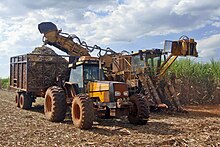
把ILUC纳入拟议的法案,引发乙醇生产商[34][35][36][37][38]和生质柴油生产商的抱怨。[82]几个环境组织对纳入ILUC表示欢迎,但认为仅花100年即可把增加的排放补偿,是把土地转化的影响低估。 [36][83][84][85][86]美国玉米种植者、生质柴油生产商、乙醇制造商,加上巴西甘蔗乙醇生产商都抱怨EPA所采的方法论,[86][87][88][89]而石油产业则是要求延缓实施。[86][90]
美国众议院在2009年6月26日以219票对212票,通过美国清洁能源和安全法案,对于再生燃料标准修订版(RFS2)的要求,授权EPA将ILUC排除,为期5年。在此期间,将进行更多研究以开发更可靠的模型和方法来估算ILUC,在EPA实施这项法案前,须经美国国会审查。 [91][92][93][94][95]但这项提案最终并未提交参议院以供讨论及表决。[96][97]
EPA在2010年2月3日发布当年及以后的RFS2最终版本。[39]法规中包含直接和重要的间接排放(包括ILUC)。EPA把新研究的评论和数据纳入。[40]采取30年的时间范围和0%的折现率(期间平均计算排放),[98]EPA的结论是多种生物燃料将符合这一标准。[99]
EPA的分析把由玉米淀粉生产的乙醇和丁醇燃料均视为“可再生燃料”。甘蔗生产的乙醇成为“先进燃料”。用废油生产的柴油和用大豆油或其他植物油脂油生产的生质柴油都属于“生物质柴油”类别。纤维素乙醇和纤维素柴油符合《纤维素生物燃料》标准。[40]
考虑到生命周期评估中的不确定性(主要是与国际土地利用变化相关的温室气体排放),EPA列表所采用的是模型估算出的温室气体排放以及变动范围后的中位数。[98]
反应
[编辑]UNICA对这项裁决表示欢迎,尤其是它较能对生命周期排放量做精确的估算,并希望巴西甘蔗乙醇被归类为先进生物燃料后有助于美国将其进口关税取消。[100][101]可再生燃料协会 (RFA) 也对此法规表示欢迎,因为乙醇生产商“需要稳定的联邦政策,让新技术在商业化后有市场保证”,但也重申他们反对ILUC的的立场。[102]
RFA还抱怨根据法规,玉米乙醇的排放计算仅减少21%,并指出如果没ILUC的条件限制,玉米乙醇可减少52%的温室气体排放计算。[102][103]RFA并反对巴西甘蔗乙醇“不成比例的获益”,因为EPA的修订版法规把最初相等的ILUC估计值,把玉米乙醇的排放数字降低一半,而把甘蔗乙醇的排放数字降低93%。[104]
几位来自美国中西部的立法者评论说,他们继续反对EPA把所谓的间接土地利用的“冒险科学”用来“惩罚国内生产的生物燃料”。[103]众议院农业委员会主席科林·彼得森说:“......认为我们能可靠地衡量国际间接土地利用的影响,是完全不符实际的看法,我将继续推动立法,防止不可靠的方法和不公平的标准给生物燃料产业增加负担。 “[103]
EPA局长丽莎·P·杰克森评论说,该机构“没放弃在其最终法规中把土地利用列入考虑,但该机构也采用新的资讯,而导致对乙醇有较为有利的计算”。[103]她所引用的是关于作物产量和生产力相关,新的科学和更佳的数据,更多关于先进生物燃料可产生的副产品的信息,以及取得160个国家(而非拟议规则中包含的40个)的土地利用数据。[103]
欧洲
[编辑]截至2010 年,欧盟和英国监管机构已体认需把ILUC考虑在内,但尚未确定最合适的做法。
英国可再生运输燃料义务
[编辑]{{see also|可再生运输燃料义务
英国的可再生运输燃料义务 (RTFO) 计划要求燃料供应商须对直接影响提出报告,并要求非政府部门公共机构可再生燃料局 (RFA) 就潜在的间接影响提出报告,包括ILUC和商品价格变化。[14]RFA在2008年7月提交的的“Gallager评论”中提到关于生物燃料和所需原料生产方面的若干风险,避免跨界用到原本农业用地所生产的粮食,但结论是“间接土地利用变化所引起的温室气体排放,将其量化,需要主观假设并包含有相当大的不确定性。[41]一些环保组织认为没把ILUC的排放考虑在内的话,会导致更多的排放。[105][106][107]
欧洲联盟
[编辑]欧洲议会在2008年12月17日核准可再生能源指令 (COM(2008)19) 和燃料品质指令修正案(指令2009/30),[108]其中包括生物燃料的可持续性标准和对ILUC的强制性考虑。此指令确立采用10%的生物燃料目标。一项单独的燃料品质指令设定欧盟的低碳燃料标准,要求到2020年时,欧盟运输燃料的温室气体强度要降低6%。这项立法要求欧盟委员会在2010年12月31日之前制定办法,本著现有最佳的科学证据,把ILUC的温室气体排影响列入考虑。[42][55][109]
与此同时,此指令也为不具有生产生物燃料原料资格的土地设立定义。这一类别包括湿地和连续森林覆盖面积超过30%的土地,而森林覆盖面积在10%到30%之间,有证据显示其现有碳储量低到足以证明转换为合理者,则不在此限。[42]
委员会随后发布三个ILUC建模运作的参考条款:一个为一般均衡模型(General Equilibrium model);[110]一个为部分均衡模型(Partial Equilibrium model),[111]一个则为对其他全球建模的运作做比较。[112]委员会还就处理ILUC[113]的几项高级选项进行过征询,有17个国家[114]和59个组织对征询提供回应。[115]联合国食物权问题特别报告员和几个环境组织抱怨2008年欧洲议会核准的指令的保障措施不足。[116][117][118][119]UNICA呼吁针对ILUC,要相关监管机构纳入生物燃料作物生产国的研究人员和科学家参与研究,建立一种具有经验证据和“全球接受的方法”。[120]
一些非政府组织在2010年指责欧盟委员会缺乏透明度,因为它不愿发布与ILUC工作有关的文件。[121]部分均衡模型和一般均衡模型做出的结果在2010年3月公布,但欧盟委员会声明其并未采纳材料中的观点。[122]资料显示在欧盟生物燃料消耗量增加1.25%的情况下,会导致全球约5,000,000公顷(12,000,000英亩)的土地利用改变。 [123]
认证计画
[编辑]欧盟委员会在2010年6月10日宣布根据再生能源指令,要建立生物燃料认证计划,进口的产品也需要认证。委员会鼓励欧盟国家、生物燃料产业和非政府组织建立自愿认证计划。[124][125]欧盟在2007年使用的生质柴油中有26%,以及生物乙醇中有31%,主要是从巴西和美国进口。 [126]
反应
[编辑]环保组织认为欧盟的措施“太弱,无法阻止急剧增加的森林砍伐”。[126][127]据绿色和平称,“生物燃料生产对土地利用变化的间接影响仍未得到妥善解决”,对他们来说,这是生物燃料最危险的问题。[127]
产业业代表对认证计画表示欢迎,一些人则对其中缺乏土地利用标准的担忧不以为意。[126][128][129]UNICA和其他产业组织希望规则中的不足处能受到补充,而有更清晰的操作框架。[128][129]
欧洲议会和欧洲部长理事会之间的谈判仍在继续。预计2014年之前不会达成协议。[130]
参见
[编辑]参考文献
[编辑]- ^ 1.0 1.1 1.2 1.3 1.4 1.5 1.6 Timothy Searchinger; et al. Use of U.S. Croplands for Biofuels Increases Greenhouse Gases Through Emissions from Land-Use Change. Science. 2008-02-29, 319 (5867): 1238–1240 [2023-04-08]. Bibcode:2008Sci...319.1238S. PMID 18258860. S2CID 52810681. doi:10.1126/science.1151861. (原始内容存档于2023-04-14). Originally published online in Science Express on 2008-02-07 available here 互联网档案馆的存档,存档日期2009-12-11.
- ^ 2.0 2.1 2.2 2.3 2.4 2.5 Michael Wang; Zia Haq. Letter to Science about Searchinger et al. article (PDF). Argonne National Laboratory. 2008-03-14 [2009-06-07]. (原始内容 (PDF)存档于2013-02-15). The published version on Science Letters is included in Searchinger E-Letter responses 2008-08-12
- ^ 3.0 3.1 Gnansounou; et al. Accounting for indirect land-use changes in GHG balances of biofuels: Review of current approaches (PDF). École Polytechnique Fédérale de Lausanne. March 2008 [2009-06-07]. (原始内容存档于2022-10-12). Working Paper REF. 437.101
- ^ 4.0 4.1 4.2 Alexander E. Farrell. Better biofuels before more biofuels. San Francisco Chronicle. 2008-02-13 [2009-06-07]. (原始内容存档于2010-02-09).
- ^ Donald Sawyer. Climate change, biofuels and eco-social impacts in the Brazilian Amazon and Cerrado.. Philosophical Transactions of the Royal Society. 2008-05-27, 363 (1498): 1747–1752. PMC 2373893
 . PMID 18267903. doi:10.1098/rstb.2007.0030. Published on line 2008-02-11.
. PMID 18267903. doi:10.1098/rstb.2007.0030. Published on line 2008-02-11.
- ^ Naylor; et al. The Ripple Effect: Biofuels, Food Security, and the Environment. Environment. November 2007 [2009-06-07]. (原始内容存档于2018-08-15).
- ^ 7.0 7.1 Renton Righelato; Dominick V. Spracklen. Carbon Mitigation by Biofuels or by Saving and Restoring Forests?. Science. 2007-08-17, 317 (5840): 902 [2023-04-08]. PMID 17702929. S2CID 40785300. doi:10.1126/science.1141361. (原始内容存档于2020-06-22).
- ^ 8.0 8.1 Farrel; Plevin, RJ; Turner, BT; Jones, AD; O'Hare, M; Kammen, DM; et al. Ethanol Can Contribute to Energy and Environmental Goals. Science. 2006-01-27, 311 (5760): 506–508 [2023-04-08]. Bibcode:2006Sci...311..506F. PMID 16439656. S2CID 16061891. doi:10.1126/science.1121416. (原始内容存档于2020-06-22)..
- ^ 9.0 9.1 9.2 9.3 9.4 9.5 9.6 Sperling, Daniel; Deborah Gordon. Two billion cars: driving toward sustainability
 . Oxford University Press, New York. 2009: 98–99. ISBN 978-0-19-537664-7. For more detail, see also the Notes 27 and 28 for Chapter 4, pp. 272.
. Oxford University Press, New York. 2009: 98–99. ISBN 978-0-19-537664-7. For more detail, see also the Notes 27 and 28 for Chapter 4, pp. 272.
- ^ 10.0 10.1 Goettemoeller, Jeffrey; Adrian Goettemoeller. Sustainable Ethanol: Biofuels, Biorefineries, Cellulosic Biomass, Flex-Fuel Vehicles, and Sustainable Farming for Energy Independence. Prairie Oak Publishing, Maryville, Missouri. 2007: 40–41. ISBN 978-0-9786293-0-4.
- ^ 11.0 11.1 Michael Wang. Updated Energy and Greenhouse Gas Emission Results of Fuel Ethanol (PDF). Center for Transportation Research, Argonne National Laboratory. [2009-06-07]. (原始内容 (PDF)存档于2013-02-15). Presented at the 15th International Symposium on Alcohol Fuels, San Diego, California.
- ^ 12.0 12.1 12.2 Michael Wang. Updated Energy and Greenhouse Gas Emission Results of Fuel Ethanol (PDF). Center for Transportation Research, Argonne National Laboratory. [2009-06-07]. (原始内容 (PDF)存档于2013-02-16). This is a public presentation of Michael Wang 2005 paper summarizing the results of the ANL study.
- ^ 13.0 13.1 Macedo Isaias, M. Lima Verde Leal and J. Azevedo Ramos da Silva. Assessment of greenhouse gas emissions in the production and use of fuel ethanol in Brazil (PDF). Secretariat of the Environment, Government of the State of São Paulo. 2004 [2008-05-09]. (原始内容 (PDF)存档于2008-05-28).
- ^ 14.0 14.1 14.2 14.3 14.4 Carbon and Sustainability Reporting Within the Renewable Transport Fuel Obligation (PDF). Department of Transport, United Kingdom. January 2008 [2009-04-25]. (原始内容 (PDF)存档于2008-06-25).
- ^ 15.0 15.1 Bryan Walsh. The Trouble With Biofuels. Time Magazine. 2008-02-14 [2009-06-07]. (原始内容存档于2012-11-03).
- ^ 16.0 16.1 Michael Grunwald. The Clean Energy Scam. Time Magazine. 2008-03-27 [2009-06-07]. (原始内容存档于2008-03-30). This article was the cover story of the April 7, 2008, print edition entitled "The Clean Energy Myth".
- ^ 17.0 17.1 Joe Jobe. The Debate on Clean Energy. Time Magazine. 2008-04-10 [2009-06-07]. (原始内容存档于2008-04-15). Reply letter by Joe Jobe, CEO of the National Biodiesel Board published in the "Inbox" section in Time's April 21 issue.
- ^ 18.0 18.1 Tom Zeller Jr. The Biofuel Debate: Good, Bad or Too Soon to Tell?. The New York Times. 2008-11-03 [2009-06-07]. (原始内容存档于2020-06-22).
- ^ 19.0 19.1 Renewable Fuels Association. Executive Summary: Understanding Land Use Change and U.S. Ethanol Expansion (PDF). The New York Times. 2008-11-08 [2009-06-07]. (原始内容存档 (PDF)于2013-05-22).
- ^ Biofuel Companies Question ARB's Inclusion of Indirect Effects in Low Carbon Fuel Standard. Green Car Congress. 2008-10-24 [2009-06-07]. (原始内容存档于2009-08-03).
- ^ 21.0 21.1 Stephen Power. If a Tree Falls in the Forest, Are Biofuels To Blame? It's Not Easy Being Green. The Wall Street Journal. 2008-11-11 [2009-06-07]. (原始内容存档于2019-10-20).
- ^ 22.0 22.1 David R. Baker. State readies stringent fuel standards. San Francisco Chronicle. 2009-04-22 [2009-06-07]. (原始内容存档于2009-07-23).
- ^ Maized and confused, Does ethanol in Iowa cause deforestation in Brazil?. The Economist. 2009-08-10 [2009-08-12]. (原始内容存档于2010-11-30).
- ^ Kurt Kleiner. The backlash against biofuels. Science. 2007-12-12, 1 (801): 9–11. doi:10.1038/climate.2007.71
 . Focus Feature published online.
. Focus Feature published online.
- ^ 25.0 25.1 Timothy Searchinger. E-Letter response to M. Wang and Z. Haq's E-Letter: Ethanol's Effects on Greenhouse Gas Emissions. Science. 2008-08-12, 319 (5867) [2009-06-07].[永久失效链接]
- ^ 26.0 26.1 26.2 Keith L. Kline; Virginia H. Dale. Biofuels: Effects on Land and Fire (PDF). Letters to Science. 2008-07-11 [2009-06-11]. (原始内容 (PDF)存档于2008-12-04). This reference also includes Timothy Searching and Joseph Fargione responses to Kline and Dale (Science Vol 321).
- ^ Public letter to Mary D. Nichols, Chairman California Air Resources Board (PDF). BioenergyWiki. 2008-06-24 [2009-06-07]. (原始内容 (PDF)存档于2011-07-23).
- ^ Public letter to Mary D. Nichols, Chairman California Air Resources Board (PDF). Union of Concerned Scientists. 2009-04-21 [2009-06-07]. (原始内容存档 (PDF)于2009-05-01).
- ^ Group of Scientists and Economists Urge Inclusion of Indirect Land Use Change Effects for Biofuels and All Transportation Fuels in California LCFS. Green Car Congress. 2009-04-21 [2009-06-07]. (原始内容存档于2009-04-25).
- ^ Maized and confused. The Economist. 2009-08-10 [2009-08-10]. (原始内容存档于2010-11-30).
- ^ New Fuels Alliance. Letter to Mary D. Nichols, CARB Chairman (PDF). California Air Resources Board. 2008-10-23 [2009-06-07]. (原始内容存档 (PDF)于2017-02-23).
- ^ 32.0 32.1 UNICA. UNICA's Comments to CARB on Sugarcane Ethanol (PDF). California Air Resources Board. 2009-04-16 [2009-06-07]. (原始内容存档 (PDF)于2019-03-02).
- ^ Renewable Fuel Standard Program (RFS2): Notice of Proposed Rulemaking. U.S. Environmental Protection Agency. 2009-05-05 [2009-05-06]. (原始内容存档于2009-05-06).
- ^ 34.0 34.1 34.2 Jim Tankersley. New standards could cut tax breaks for corn-based ethanol. Los Angeles Times. 2009-05-06 [2009-05-06]. (原始内容存档于2009-05-09).
- ^ 35.0 35.1 Suzanne Goldenberg. Barack Obama's $1.8bn vision of greener biofuel. The Guardian (London). 2009-05-06 [2009-05-06]. (原始内容存档于2019-04-23).
- ^ 36.0 36.1 36.2 Steven Mufson; Juliet Eilperin. EPA Proposes Changes To Biofuel Regulations. The Washington Post. 2009-05-06 [2009-05-06]. (原始内容存档于2016-06-09).
- ^ 37.0 37.1 Jennifer Kho. Corn Ethanol Crew Cries Foul Over EPA Emissions Ruling. earth2tech.com. 2009-05-05 [2009-05-06]. (原始内容存档于2009-05-09).
- ^ 38.0 38.1 UNICA Press Release. Sugarcane Ethanol Industry Eager to Implement U.S. Renewable Fuel Standard. National Press Release. 2009-05-05 [2009-05-06]. (原始内容存档于2023-04-14).
- ^ 39.0 39.1 Renewable Fuel Standard Program (RFS2): Final Rule. U.S. Environmental Protection Agency. 2010-02-03 [2010-02-09]. (原始内容存档于2010-03-05).
- ^ 40.0 40.1 40.2 Greenhouse Gas Reduction Thresholds. U.S. Environmental Protection Agency. 2010-02-03 [2010-02-09]. (原始内容存档于2011-11-14).
- ^ 41.0 41.1 Ed Gallagher. The Gallagher Review of the indirect effects of biofuels production (PDF). Renewable Fuels Agency. July 2008 [2009-06-09]. (原始内容 (PDF)存档于2009-10-18). See Chapter 2: The effect of land-use change on GHG savings from biofuels.
- ^ 42.0 42.1 42.2 European Parliament. Texts adopted Wednesday, 2008-12-17: Monitoring and reduction of greenhouse gas emissions from fuels. 2008-12-17 [2009-06-09]. (原始内容存档于2021-05-06). For ILUC see "Whereas" items 11 through 18
- ^ Mark A. Delucchi. Lifecycle Analyses of Biofuels (Draft Report) (PDF). University of California, Davis. May 2006 [2009-06-11]. (原始内容存档 (PDF)于2012-02-20). Institute of Transportation Studies UCD-ITS-RR-06-08. See pp. 13–14.
- ^ Searchinger; et al. Supporting Materials for Use of U.S. Croplands for Biofuels Increases Greenhouse Gases Through Emissions from Land Use Change (PDF). Princeton University. 2008 [2009-06-11]. (原始内容 (PDF)存档于2011-10-10). Data taken from Table 1B, pp. 21.
- ^ 45.0 45.1 Fargione; Hill, J; Tilman, D; Polasky, S; Hawthorne, P; et al. Land Clearing and the Biofuel Carbon Debt. Science. 2008-02-29, 319 (5867): 1235–1238 [2023-04-08]. Bibcode:2008Sci...319.1235F. PMID 18258862. S2CID 206510225. doi:10.1126/science.1152747. (原始内容存档于2023-04-14). Originally published online in Science Express on 2008-02-07, available here 互联网档案馆的存档,存档日期2010-10-29..
- ^ "For example, using Searchinger’s “indirect analysis” approach you can “prove” that increasing the mileage standards for vehicles contributes to global warming. Consider: Every gallon of gasoline not used by a motorist saves him $3.50 at today’s prices. He can use that money to buy other things. For example, at current prices (about $80 per ton), $3.50 could buy him about 90 pounds of coal. Burning that coal would obviously produce far more carbon dioxide emissions than burning the 6 pounds of carbon in one gallon of gas. So higher mileage standards for cars cause global warming. Q.E.D.", in: Zubrin, Robert. Merchants of Despair: Radical Environmentalists, Criminal Pseudo-Scientists, and the Fatal Cult of Antihumanism. New Atlantis Books. 2012. ISBN 978-1594034763.
- ^ 47.0 47.1 Timothy Searchinger. Response to New Fuels Alliance and DOE Analysts Criticisms of Science Studies of Greenhouse Gases and Biofuels (PDF). BioenergyWiki. 2008-02-26 [2009-06-11]. (原始内容 (PDF)存档于2008-05-16).
- ^ New Fuels Alliance. Statement in Response to Science Articles on Biofuels (PDF). Renewable Fuels Association. [2009-06-11]. (原始内容 (PDF)存档于2008-07-27).
- ^ 49.0 49.1 49.2 49.3 Lapola; Schaldach, R; Alcamo, J; Bondeau, A; Koch, J; Koelking, C; Priess, JA; et al. Indirect land-use changes can overcome carbon savings from biofuels in Brazil. Proceedings of the National Academy of Sciences. 2010-02-08, 107 (8): 3388–93. Bibcode:2010PNAS..107.3388L. PMC 2840431
 . PMID 20142492. doi:10.1073/pnas.0907318107
. PMID 20142492. doi:10.1073/pnas.0907318107  .. Published online before print.
.. Published online before print.
- ^ 50.0 50.1 50.2 50.3 Rhett A. Butler. Amazon rainforest will bear cost of biofuel policies in Brazil. Mongabay.com. 2010-02-08 [2010-02-09]. (原始内容存档于2013-01-29).
- ^ Philip Brasher. Brazil biofuels' land-use issue. Des Moines Register. 2010-02-08 [2010-02-09]. (原始内容存档于2016-05-16).
- ^ 52.0 52.1 Arima, E., Richards, P., Walker, R. and Caldas, M. M. Statistical Confirmation of Indirect Land Use Change in the Brazilian Amazon. Environmental Research Letters. 2011-05-24, 6 (1498): 1747–1752. Bibcode:2011ERL.....6b4010A. doi:10.1088/1748-9326/6/2/024010
 .
.
- ^ 53.0 53.1 Wyatt Buchanan. Air Resources Board moves to cut carbon use. San Francisco Chronicle. 2009-04-24 [2009-04-25]. (原始内容存档于2011-09-17).
- ^ 54.0 54.1 California: Low-Carbon-Fuels Mandate. The New York Times. The Associated Press. 2009-04-24 [2009-05-21]. (原始内容存档于2012-03-03).
- ^ 55.0 55.1 Proposed Regulation to Implement the Low Carbon Fuel Standard. Volume I: Staff Report: Initial Statement of Reasons (PDF). California Air Resources Board. 2009-03-05 [2009-04-26]. (原始内容存档 (PDF)于2009-05-03).
- ^ Air Resources Board: Resolution 09-31, 2009-04-23 (PDF). California Air Resources Board. 2009-04-23 [2009-05-31]. (原始内容存档 (PDF)于2017-02-20). Final resolution, pp 8.
- ^ Draft Attachment B: Public Hearing to Consider Adoption of a Proposed Regulation to Implement the Low Carbon Fuel Standard - Staff's Suggested Modifications to the Original Proposal (PDF). CARB. 2003-04-23 [2009-04-30]. (原始内容 (PDF)存档于2009-06-13).
- ^ Comment Log for Low Carbon Fuel Standard (LCFS09). California Air Resources Board. [2009-04-28]. (原始内容存档于2009-04-29). All letters and attachments are posted for public view of this site.
- ^ Public letter to Mary D. Nichols, Chairman California Air Resources Board (PDF). BioenergyWiki. 2008-06-24 [2009-04-28]. (原始内容 (PDF)存档于2011-07-23).
- ^ 60.0 60.1 Biofuel Companies Question ARB's Inclusion of Indirect Effects in Low Carbon Fuel Standard. Green Car Congress. 2008-10-24 [2009-04-28]. (原始内容存档于2009-08-03).
- ^ Leading Advanced Biofuel Companies, Researchers, Investors Call on Air Resources Board to Reconsider Draft Low Carbon Fuel Regulations (PDF). New Fuels Alliance. 2008-10-23 [2009-04-26]. (原始内容 (PDF)存档于2009-05-09).
- ^ Public letter to Mary D. Nichols, Chairman California Air Resources Board (PDF). Union of Concerned Scientists. 2009-04-21 [2009-04-26]. (原始内容存档 (PDF)于2009-05-01).
- ^ Group of Scientists and Economists Urge Inclusion of Indirect Land Use Change Effects for Biofuels and All Transportation Fuels in California LCFS. Green Car Congress. 2009-04-21 [2009-04-28]. (原始内容存档于2009-04-25).
- ^ 64.0 64.1 Debra Kahn. California Adopts Low-Carbon Fuel Standar. Scientific American. 2009-04-24 [2009-05-04]. (原始内容存档于2023-03-06).
- ^ Kate Galbraith. California Fuel Move Angers Ethanol Makers. The New York Times. 2009-04-24 [2009-04-29]. (原始内容存档于2023-04-14).
- ^ 66.0 66.1 66.2 66.3 Jim Lane. CARB votes 9-1 for California Low Carbon Fuel Standard; moves up indirect land use review to Jan 2011 in response to outcry on ILUC. BiofuelsDigest. 2009-02-24 [2009-04-29]. (原始内容存档于2009-09-11).
- ^ 67.0 67.1 67.2 Jeff St. John. California Adopts Low Carbon Fuel Standard. GreenMedia. 2009-04-23 [2009-05-04]. (原始内容存档于2009-04-27).
- ^ 68.0 68.1 68.2 California adopts first-ever low-carbon fuel rule. CNN News. 2009-04-23 [2009-04-28]. (原始内容存档于2009-04-27).
- ^ 69.0 69.1 69.2 Dale Kasler. California's low-carbon fuel standard has oil companies anxious. The Sacramento Bee. 2009-04-25 [2009-05-04]. (原始内容存档于2009-04-30).
- ^ 70.0 70.1 UNICA Press release. Sugarcane Ethanol Passes Critical Test in California. World-Wire. 2009-04-24 [2009-04-25]. (原始内容存档于2009-04-26).
- ^ UNICA. UNICA: Sugarcane Ethanol Meets CARB Low Carbon Fuel Standard. Biofuels Journal. 2009-04-17 [2009-04-29]. (原始内容存档于2011-09-10).
- ^ Power, Stephen. Ethanol Groups Sue California Over Low-Carbon Rule. The Wall Street Journal. 2009-12-24 [2009-12-29]. (原始内容存档于2016-01-15).
- ^ Ethanol Groups File Suit Challenging Constitutionality of California Low Carbon Fuel Standard. Green Car Congress. 2009-12-25 [2009-12-29]. (原始内容存档于2011-03-09).
- ^ Ethanol Groups Challenge Constitutionality of California LCFS. Renewable Fuels Association. 2009-12-24 [2009-12-29]. (原始内容存档于2011-07-08).
- ^ 75.0 75.1 75.2 75.3 EPA Lifecycle Analysis of Greenhouse Gas Emissions from Renewable Fuels - Technical Highlights (PDF). [2009-06-07]. (原始内容存档 (PDF)于2009-06-29).
- ^ 76.0 76.1 76.2 76.3 EPA Proposes New Regulations for the National Renewable Fuel Standard Program for 2010 and Beyond. U.S. Environmental Protection Agency. 2009-05-05 [2009-06-16]. (原始内容存档于2009-07-21).
- ^ 77.0 77.1 77.2 77.3 EPA Proposes New Regulations for Renewable Fuel Standard to Implement Requirements of EISA; GHG Reduction and Indirect Land Use Change Effects Included. Green Car Congress. 2009-05-05 [2009-06-16]. (原始内容存档于2012-03-20).
- ^ Renewable Fuel Standard Program (RFS2): Notice of Proposed Rulemaking. U.S. Environmental Protection Agency. May 2009 [2009-06-16]. (原始内容存档于2009-05-06).
- ^ President Obama Announces Steps to Support Sustainable Energy Options, Departments of Agriculture and Energy, Environmental Protection Agency to Lead Efforts. whitehouse.gov. 2009-05-05 [2009-05-05]. (原始内容存档于2023-04-14) –通过National Archives.
- ^ Matthew L. Wald. White House Steps Up Support for Biofuels. The New York Times. 2009-05-05 [2009-05-05]. (原始内容存档于2009-05-08).
- ^ Ben Geman. Obama Administration Prepares to Push Biofuels. Scientific American. 2009-05-05 [2009-05-05]. (原始内容存档于2009-10-18).
- ^ Kate Galbraith. Biodiesel Makers Lash Out at E.P.A. Rule. The New York Times. 2009-07-09 [2009-06-16]. (原始内容存档于2023-04-14).
- ^ EPA Confirms Most Corn Ethanol Worsens Global Warming Pollution. Friends of the Earth. 2009-05-05 [2009-06-17]. (原始内容存档于2009-05-08).
- ^ EPA's RFS Proposal: One Step Forward … and Another Step Back? (PDF). Clean Air Task Force. 2009-05-05 [2009-06-17]. (原始内容 (PDF)存档于2010-02-15).
- ^ Vincent Carroll. Coddling the ethanol industry. The Denver Post. 2009-05-09 [2009-06-16]. (原始内容存档于2016-03-03).
- ^ 86.0 86.1 86.2 Difficult EPA Public Hearing on Biofuels Mandate. SugarcaneBlog.com. 2009-06-09 [2009-06-17]. (原始内容存档于2022-12-11).
- ^ Biofuel Producers Give EPA an Earful on Renewable Fuel Standard. Environment News Service. 2009-06-09 [2009-06-17]. (原始内容存档于2016-03-03).
- ^ BIO asks EPA to maintain flexibility in life-cycle analysis for RFS. Biomass Magazine. 2009-06-06 [2009-06-17]. (原始内容存档于2011-07-24).
- ^ Public Hearing on EPA's Proposed RFS Rule. Renewable Fuels Association. 2009-06-09 [2009-06-17]. (原始内容存档于2023-03-06).
- ^ Nick Snow. API, NPRA ask EPA to consider delay of RFS-2 implementation. Oil & Gas Journal. 2009-06-09 [2009-06-17]. (原始内容存档于2023-01-26).
- ^ Jim Lane. Climate change bill passes, with five-year punt on indirect land use change. Biofuels Digest. 2009-06-29 [2009-07-05]. (原始内容存档于2011-08-09).
- ^ Kirsten Korosec. Climate Change Bill Passes on Razor-Thin Margin, Tougher Battle Lies Ahead. BNET Energy. 2009-06-27 [2009-07-05]. (原始内容存档于2009-07-03).
- ^ House passes historic climate bill. Renewable Fuels Association. 2009-06-26 [2009-07-05]. (原始内容存档于2011-07-08).
- ^ Bravender, Robin; Geman, Ben; Luntz, Taryn. Farm Interests Use EPA Spending Bill to Fight Climate Regs. The New York Times. 2009-06-19 [2009-06-26]. (原始内容存档于2009-06-23).
- ^ Compromise Amendment to Waxman-Markey Bill Prohibits EPA From Using Indirect Land Use Change Metrics on Biofuels for 5 Years While National Academies Research the Issue. Green Car Congress. 2009-06-26 [2009-06-26]. (原始内容存档于2009-06-30).
- ^ Kate Sheppard. Was Waxman-Markey A Waste of Energy?. Mother Jones. 2010-03-09 [2016-09-14]. (原始内容存档于2022-12-11).
- ^ Speth, James G. They Knew: The US Federal Government's Fifty-year Role in Causing the Climate Crisis. Cambridge, MA: MIT Press. 2021: Chapter 7.
- ^ 98.0 98.1 Renewable Fuel Standard Program(RFS2) Regulatory Impact Analysis (PDF). U.S. Environmental Protection Agency. February 2010 [2010-02-12]. (原始内容 (PDF)存档于2011-02-02). See pp. 480 and 489 and Tables 2.6-1 to 2.6-11.
- ^ James Kanter. Questions About Biofuels' Environmental Costs Could Alter Europe's Policies. The New York Times. 2010-02-11 [2010-02-14]. (原始内容存档于2010-02-12).
- ^ Agência ambiental dos EUA reconhece etanol de cana como biocombustível avançado. UNICA. 2010-02-03 [2010-02-14]. (原始内容存档于2011-07-06) (葡萄牙语).
- ^ EPA Deems Sugarcane Ethanol an Advanced Biofuel. DOMESTICFUEL.com. 2010-02-04 [2010-02-14]. (原始内容存档于2010-02-14).
- ^ 102.0 102.1 RFS Rules "Workable" - ILUC Inclusion Still Problematic. Renewable Fuels Association. 2010-02-03 [2010-02-14]. (原始内容存档于2011-07-08).
- ^ 103.0 103.1 103.2 103.3 103.4 Allison Winter. New Biofuels Regs Could Still Face Fight From Capitol Hill. The New York Times. 2010-02-04 [2010-02-16]. (原始内容存档于2016-01-28).
- ^ Issue Brief: Summary of RFS2 Final Rule (PDF). Renewable Fuels Association. 2010-02-04 [2010-02-14]. (原始内容 (PDF)存档于2010-02-15).
- ^ Alok Jha. UK biofuels target creating more emissions, environmentalists claim. The Guardian (London). 2009-04-15 [2009-06-16]. (原始内容存档于2023-03-06).
- ^ Green fuels produce twice as much carbon as fossil fuels. The Daily Telegraph (London). 2009-04-15 [2009-06-16]. (原始内容存档于2009-04-20).
- ^ Petrol must now include biofuels. BBC News. 2008-04-15 [2009-06-16]. (原始内容存档于2023-03-06).
- ^ Directive 2009/30/EC of the European Parliament and of the Council of 23 April 2009. EUR Lex. [2010-01-29]. (原始内容存档于2014-01-07).
- ^ Europe to Study Indirect Land Use. Biofuels and Climate Change. 2008-12-31 [2009-06-13]. (原始内容存档于2009-06-15).
- ^ Annex A - Terms of Reference - The indirect land use change impact of biofuels (PDF). European Commission. 2009-06-29 [2010-01-29]. (原始内容存档 (PDF)于2016-03-03).
- ^ Annex 1 - Terms of Reference (PDF). European Commission. [2010-01-29]. (原始内容存档 (PDF)于2016-03-04).
- ^ Terms of Reference - Administrative arrangement between JRC and DG ENV on Indirect Land Use Change emissions from biofuels (PDF). European Commission. [2010-01-29]. (原始内容存档 (PDF)于2016-03-04).
- ^ Indirect land use change – Possible elements of a policy approach – preparatory draft for stakeholder/expert comments (PDF). European Commission. [2010-01-29]. (原始内容存档 (PDF)于2016-03-03).
- ^ ILUC Consultation comments by country. European Commission. [2010-01-29]. (原始内容存档于2016-03-04). Download zip file with comments from 17 countries in PDF format.
- ^ ILUC Consultation comments by organisation. European Commission. [2010-01-29]. (原始内容存档于2016-03-04).Download zip file with comments from 59 organisations in PDF format.
- ^ James Kanter. Biofuels and 'Land Grabs' in Poor Nations. The New York Times. 2009-06-12 [2009-06-13]. (原始内容存档于2009-12-08).
- ^ WWF European Policy Office. EU Renewable Energy Directive 2008 - Summary of WWF position (PDF). World Wide Fund for Nature. [2009-06-07]. (原始内容存档 (PDF)于2011-07-16).
- ^ Final Biofuel Directive limits impact on wetlands. Wetlands International. [2009-06-13]. (原始内容存档于2010-07-04).
- ^ Inadequacy of the Renewable Energy Directive. BirdLife International. [2009-06-13]. (原始内容存档于2013-08-01).
- ^ UNICA calls for globally harmonized methodologies to assess Indirect Land Use Change in IEA conference in Rotterdam. UNICA. 2009-05-28 [2009-06-17].
- ^ Green groups sue Commission over withheld biofuels docs. Transport & Environment. 2010-03-09 [2010-03-29]. (原始内容存档于2011-09-29).
- ^ Renewable Energy: Studies - Land Use Change. European Energy Commission. 2010-03-26 [2010-03-29]. (原始内容存档于2014-06-08).
- ^ Biofuels and global trade study goes online. European Commission Chief Economist. March 2010 [2010-03-29]. (原始内容存档于2021-10-06).
- ^ Commission sets up system for certifying sustainable biofuels. European Commission. 2010-06-10 [2010-06-13]. (原始内容存档于2011-10-15).
- ^ European Commission Sets Up System for Certifying Sustainable Biofuels. Green Car Congress. 2010-06-10 [2010-06-13]. (原始内容存档于2010-07-21).
- ^ 126.0 126.1 126.2 Mark Kinver. EU biofuels 'need to be certified for sustainability'EU biofuels 'need to be certified for sustainability'. BBC News. 2010-06-10 [2010-06-13]. (原始内容存档于2010-06-12).
- ^ 127.0 127.1 Broken biofuel policies still driving rainforest destruction. Greenpeace European unit. 2010-06-10 [2010-06-13]. (原始内容存档于2010-06-16).
- ^ 128.0 128.1 James Kanter. Parsing Europe's New Biofuel Rules. The New York Times. 2010-06-11 [2010-06-13]. (原始内容存档于2011-07-23).
- ^ 129.0 129.1 Platts Commodity News. Trade bodies welcome EU biofuels rules, but call for more guidance. UNICA, Brazil. 2010-06-11 [2010-06-13]. (原始内容存档于2011-07-06).
- ^ EU Biofuels & ILUC: No deal before 2014, says Irish EU Presidency. [2013-11-02]. (原始内容存档于2013-11-03).
外部链接
[编辑]- Amendments to the European Renewable Energy Sources Directive (页面存档备份,存于互联网档案馆) (approved December 17, 2008.
- CARB: Detailed California-modified GREET pathway for U.S. corn ethanol (页面存档备份,存于互联网档案馆) (February 27, 2009, version 2.1)
- CARB: Detailed California-modified GREET pathway for Brazilian sugarcane ethanol (页面存档备份,存于互联网档案馆) (February 27, 2009, version 2.1)
- CARB: Proposed Regulation to Implement the Low Carbon Fuel Standard (页面存档备份,存于互联网档案馆) (approved April 23, 2009)
